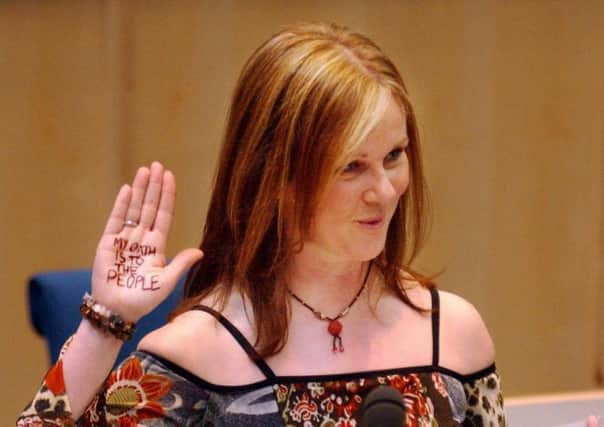Scottish Parliament at 20: Diversity of 2003 election result a distant memory


The Scottish election of 2003 produced the “Rainbow Parliament”, the broadest mix of political parties and widest cross-section of views ever to occupy the 129 seats at Holyrood.
Seven party groups were returned, including a record seven Greens and six Scottish Socialists. Older people also found a direct voice in Holyrood through John Swinburne, leader of the Scottish Senior Citizen’s Unity party. There was also three independents with both Margo MacDonald in the Lothians and Dennis Canavan in Falkirk returned, while former GP Jean Turner won a shock victory in Strathkelvin and Bearsden, standing against hospital closures.
Advertisement
Hide AdAdvertisement
Hide AdThe Labour Party still had the biggest quota in the chamber with 50 seats, almost twice the SNP figure of 27. but both the two main parties had lost seats, while the Conservatives had 18 and the Liberal Democrats 17.
It signalled a shift towards a greater diversity of debate at Holyrood. And although Labour and the Liberal Democrats still had the numbers to form a Coalition administration, the new political make-up at Holyrood did usher in a more collegiate approach in the days before politics in Scotland became so dominated by the constitutional issue.
Perhaps the defining moment of the new “rainbow” make-up was when the Scottish Socialist Party’s Rosie Kane was sworn in, taking her oath to the Queen with her right hand raised to reveal the words “my oath is to the people” scrawled on the palm of her hand.
The Rainbow Parliament saw a record nine members’ bills introduced by MSPs themselves, rather than waiting for the Government to legislate.
This compared with two the following session between 2007 and 2011. The veteran anti-poll tax campaigner Tommy Sheridan, leader of the Scottish Socialist party (SSP), was among first off the mark with a bill which would have seen the council tax abolished and replaced with a local income tax.
It fell at the first hurdle when MSPs rejected the general principles, despite the SNP campaigning on a similar policy in 2007 when the party won the election.
Margo MacDonald also took on the controversial issue of prostitution, introducing a bill to legalise “tolerance zones”. It came after a long-running experiment, operating in Edinburgh’s Leith area was scrapped after complaints from residents.
The move did thrust the issue into the spotlight although Margo eventually withdrew the bill after Scottish ministers pledged to take it on and subsequent legislation was passed. It fostered a sense that the Parliament was emerging as a fulcrum of creative ideas and people.
Advertisement
Hide AdAdvertisement
Hide AdBut the dream began to tarnish as the SSP was torn apart by infighting when Sheridan sued the now defunct News of the World newspaper over claims about his private life. The subsequent trial gripped Scottish politics, but tore the party apart, as some of its MSPs claimed Sheridan had admitted visiting a swingers club in Manchester to them, while he denied it.
The fall-out saw the SSP wiped at the election of 2007, while the Greens were reduced to just two. With Canavan stepping down, only Margo survived outside the main parties.
The Rainbow Parliament was probably less about a new dawn than a shifting political dynamic. Voters weren’t particularly enamoured with Jack McConnell’s management-style approach to governance and John Swinney was uninspiring as SNP leader.
As the bigger parties floundered, Scots were ready to look elsewhere. By 2007, with the SNP in the hunt for victory under Alex Salmond, the election became a traditional two-horse race with the smaller parties squeezed out. And as constitutional politics appears to dominate all in Scotland, the prospect of 2003 being repeated any time seems as distant as that pot of gold at the end of the rainbow.
Scott Macnab
